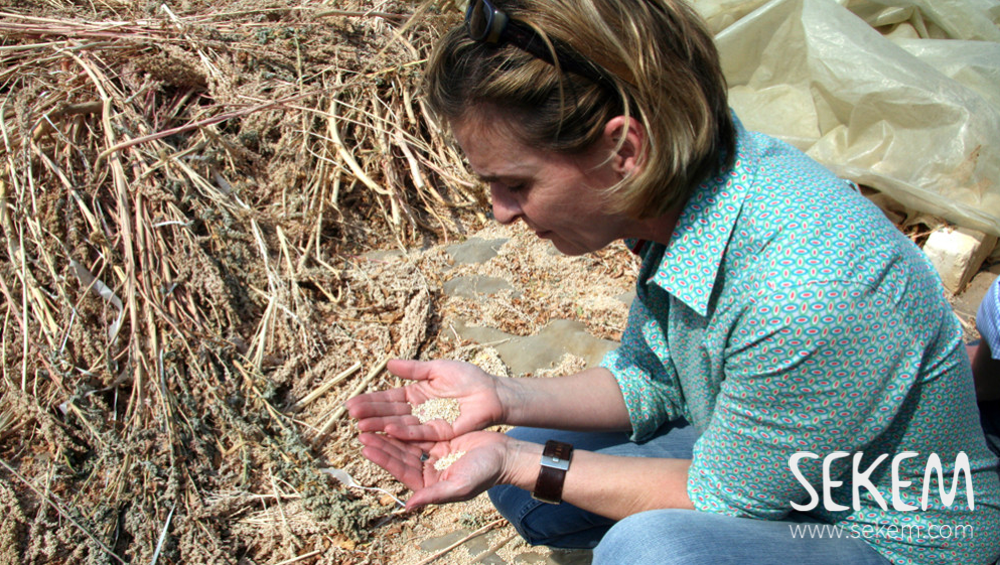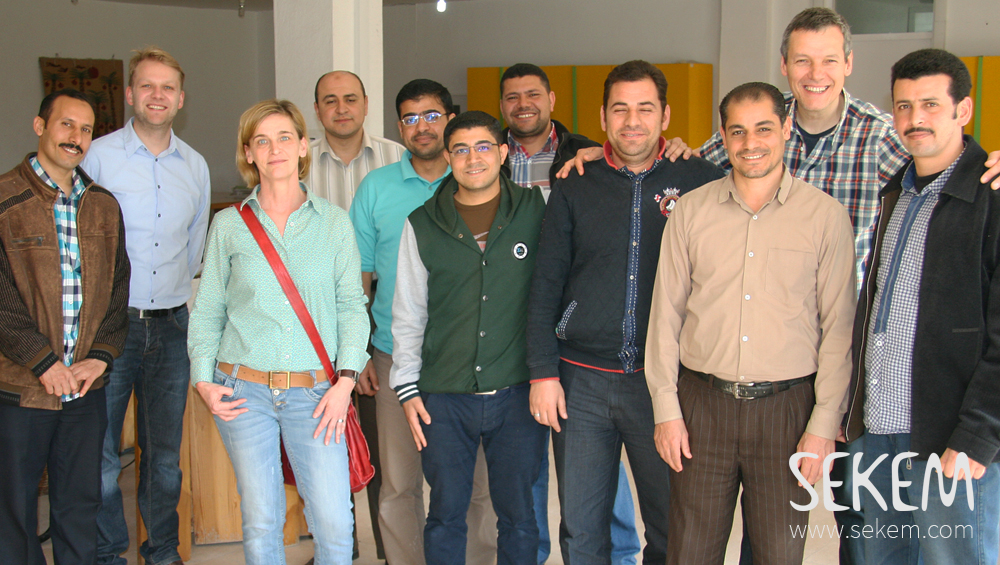Friends and partners from Germany’s Davert GmbH, the company that develops and distributes SEKEM products for the German market, visited the farm. They recount their time in Egypt in an extensive article.
EgyptAir MS 786 brings me and my colleagues Sigrid Ahrens, Axel Frerks and Tino Nitsch safely to Egypt. We have been invited to the SEKEM farm near Cairo. In Germany, we all jointly take care of the development of new SEKEM products and their sale on the German market. Now we wanted to see with our own eyes on what kind of farm the products that we sell exactly are produced. It quickly dawns on us, however, that the term „farm“ might a bit inappropriate.
It is already dark when we land at the Egyptian capital on the river Nile. Orange lines crisscross the boundless dark area below us. We can distinguish the densely traveled roads and the chaotic traffic of Cairo already from the aircraft. The immigration procedure eventually behind us we are warmly welcomed by an Egyptian SEKEM co-worker at the airport. At around 9 in the evening after about an hour’s drive over bumpy highways, we reach the SEKEM farm, a huge oasis in the middle of a rocky desert.
We spend the first evening with our local contacts, Andreas Kalbhenn and Angela Hofmann, two German co-workers who live permanently in Egypt and have dedicated themselves body and soul to the development of the initiative. I am delighted to finally meet Helmy Abouleish, CEO of the SEKEM Group of companies, in person.
From Egypt Into the World: Textiles Made from Biodynamic Cotton
After a short night under the mosquito net the next day begins with a steaming hot cup of SEKEM Moringa tea and homemade bread. This is followed by appointments and more appointments as there is so much to see and discuss. We visit NatureTex, SEKEMs company for organic textiles that is headed by Helmy Abouleish’s wife Konstanze and which serves several brands including some, among others, producing quality children‘s and baby clothing.
The factory of SEKEMs company ISIS, where millions of tea bags are filled every year, welcomes us already meters away from the front door with an intense scent of herbs and spices. As in the textiles factory, we are greeted by countless cheerfully faces here. Andreas welcomes many of the workers with a handshake and a brief chat. The employees receive fair wages and find good working conditions at SEKEMs plants.

The lines where SEKEM processes its dates for the production of its many date products is of particular interest to us. Many of these are sold also in Germany. Here, a lot of work is still done by hand. Each date is examined for pests, prepared by hand, and then packed into colourful boxes. We are asked to try some of the delicious sweets. Mouth-watering!
Before lunch, we are invited to participate in a particularly fascinating event: At the weekly SEKEM School celebration, where the different grades at the institution exhibit their singing and dancing skills to a delighted audience. A fixed ritual to wind down the school week before Friday, the weekend day that among Muslims is traditionally spent with the family. The opening of the event by the former professional musician Andreas Kalbhenn who performs the song „What a wonderful world“ is a real highlight. Unplugged and live, at 1 in the afternoon in the desert – I am deeply impressed!
41,000 Patients per Year
After the event, we have the opportunity to visit the SEKEM Medical Centre. Here, many hundreds of people from the surrounding areas receive medical care every day – during the last year alone, the hospital treated more than 41,000 patients.
“It seems like there is hardly anything on SEKEMs fields that is not cultivated at least for trial purposes.”
The remaining afternoon was then spent with „field“ studies. It seems like there is hardly anything on SEKEMs fields that is not at least cultivated for trial purpose. We pass huge plantations of date palms, fragrant fields with bright orange marigolds. Apparently, the quinoa that was only recently planted to test its growth, enjoys the Egyptian sun and the barren desert floor is also good enough for it. Plus, SEKEM also does livestock farming. The brown cows with their natural horns, typical for Biodynamic agriculture provide a great photo opportunity. At the end of our visit, our sales manager Axel even succeeds in fulfilling a childhood dream: plucking a ripe orange directly from the tree. Yummy!
After participating in the traditional weekend circle of co-workers on SEKEMs central square, at which all co-workers are personally taken leave of bye Helmy Abouleish, the desert is calling us. Our guide Rafik Costandi picks us up in a Jeep at sunset and we leave for the barren steppe. It is exciting to see how the country SEKEM was built on looked like before it was reclaimed.
We already have to say goodbye the next morning. It is clear to us now,that you have to experience SEKEM yourself to truly understand its relevance. Reconciling Muslim and European culture, sustainable agriculture and professional production, work and life in the SEKEM community is second to none.
Tino Nitsch (Davert GmbH)
Read the article in German
Get to know more about SEKEMs and Daverts cooperation

